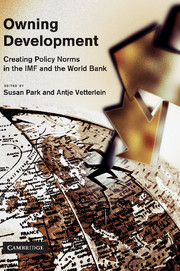Book contents
- Frontmatter
- Contents
- List of figures
- List of tables
- List of contributors
- Preface and acknowledgements
- List of acronyms and abbreviations
- Part One Introduction
- Part Two Norm emergence
- 2 Internal or external norm champions: the IMF and multilateral debt relief
- 3 From three to five: the World Bank's pension reform policy norm
- 4 The strategic social construction of the World Bank's gender and development policy norm
- Part Three Norm stabilization
- Part Four Norm subsiding
- Part Five Conclusion
- Bibliography
- Index
4 - The strategic social construction of the World Bank's gender and development policy norm
Published online by Cambridge University Press: 02 December 2010
- Frontmatter
- Contents
- List of figures
- List of tables
- List of contributors
- Preface and acknowledgements
- List of acronyms and abbreviations
- Part One Introduction
- Part Two Norm emergence
- 2 Internal or external norm champions: the IMF and multilateral debt relief
- 3 From three to five: the World Bank's pension reform policy norm
- 4 The strategic social construction of the World Bank's gender and development policy norm
- Part Three Norm stabilization
- Part Four Norm subsiding
- Part Five Conclusion
- Bibliography
- Index
Summary
Introduction
Central to this book's constructivist study of policy norms is the question of how international financial institutions produce the ideas and practices that ‘frame the world’ and become the ‘common sense’ that governs many aspects of the world economy (Bøås and McNeill 2004; see also Finnemore 1996). These have been critical questions in scholarship on the World Bank, the largest lender in the field of international development aid and the self-identified ‘Knowledge Bank’ that produces and disseminates cutting-edge research and data on development. How the World Bank (henceforth the Bank) accepts or rejects development ideas, how policy norms are internalized and subsequently diffused within the organization, how (or whether) these ideas and norms are translated into the real operational practices of the Bank and what degree of validity they reach are salient issues to anyone interested in understanding how development is thought about and acted upon in the world today.
This chapter accepts the challenge posed by Park and Vetterlein to examine how ideas are ‘taken up’ by international institutions and transformed into policies and practices. My chosen case is the Bank and the gender and development (GAD) policy norm. Notably, this is not a case where the Bank's embrace of GAD represents the origins of or catalyst for an emerging global policy norm. Rather, this is a unique case where the Bank has responded, rather late in the game, to a policy norm that already was more or less firmly adopted by corresponding institutions.
- Type
- Chapter
- Information
- Owning DevelopmentCreating Policy Norms in the IMF and the World Bank, pp. 70 - 90Publisher: Cambridge University PressPrint publication year: 2010
- 12
- Cited by



